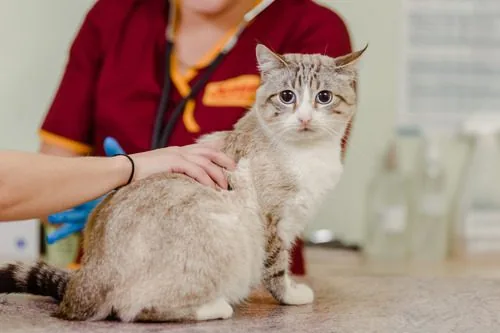Can Cats Get Heartworm

Heartworm disease is a serious health concern that affects not only dogs but also cats. This blog explores the risks, symptoms, diagnosis, and prevention of heartworm disease in cats, aiming to provide valuable insights for cat owners. If you have concerns or questions about heartworm disease in your feline friend, call West Loop Veterinary Care at our Chicago, IL, location at (312) 421-2275, or our Streeterville location at (312) 766-5959 to schedule an appointment.
Understanding Heartworm Disease in Cats
Heartworm disease is caused by a parasitic worm known as Dirofilaria immitis. The disease is transmitted through mosquito bites and is a risk to cats in many parts of the United States. Unlike dogs, cats are not typical hosts for heartworms, which means the worms do not thrive as well inside a cat’s body. However, even a few worms can cause significant health problems.
The Risk to Cats
Cats can get heartworms, and the effects can be devastating. In cats, the heartworms may not reach the adult stage, but even immature worms can cause a condition known as heartworm associated respiratory disease (HARD). The presence of the worms can lead to severe lung disease and other symptoms, such as coughing, lethargy, and weight loss.
Symptoms of Heartworm Disease in Cats
The symptoms of heartworm disease in cats can be very subtle or very dramatic. Symptoms may not appear until the disease has progressed significantly, making early detection and diagnosis critical. Common signs include:
- Coughing
- Difficulty breathing
- Periodic vomiting
- Weight loss
- Lethargy or decreased activity
Detecting Heartworm Disease
Due to the elusive nature of the symptoms, diagnosing heartworm in cats can be challenging. Blood tests to identify heartworm proteins, known as antigens, are one of the methods veterinarians use to diagnose heartworm infections. However, negative test results do not necessarily rule out heartworm disease, which is why a combination of blood tests and imaging studies, such as X-rays or ultrasound, may be necessary.
Prevention of Heartworm Disease in Cats
Preventing heartworm disease in cats is essential, as there is no approved treatment for heartworm infection in cats once it occurs. Here are actionable steps you can take to protect your feline:
- Regular Preventive Medication: Administer monthly heartworm preventive medication to your cat. These can come in various forms such as pills, topical liquids, or injectable products.
- Consult Your Veterinarian: Speak with your vet to determine the best type of preventive medication based on your cat’s health and lifestyle.
- Maintain Year-Round Prevention: It’s important to give your cat heartworm prevention medication all year round, not just during the warmer months when mosquitoes are active.
- Keep Your Environment Mosquito-Free: Reduce mosquito exposure by keeping your home and environment free from standing water where mosquitoes breed. Use mosquito repellents and insect screens where practical.
- Regular Veterinary Check-ups: Ensure your cat has regular health check-ups to help detect any early signs of heartworm disease and to keep their preventive care up to date.
What to Do If Your Cat Is Diagnosed with Heartworm
If your cat is diagnosed with heartworm disease, the treatment approach will differ significantly from that used in dogs. Due to the lack of a safe and effective treatment protocol for heartworm in cats, the focus will primarily be on managing symptoms and providing supportive care.
Supportive Care Strategies
Managing a cat with heartworm disease involves close monitoring and routine veterinary check-ups. Your vet may recommend medications to help control symptoms like inflammation and respiratory distress. In severe cases, hospitalization may be necessary to provide intensive care and monitoring.
Protecting Your Cat From Heartworm Disease
Heartworm disease poses a real threat to cats, though many cat owners are not aware that their pets are at risk. Regular preventive care, early diagnosis, and appropriate management are critical components of keeping your cat healthy. If you’re concerned about heartworm disease or need to start your cat on preventive care, call West Loop Veterinary Care in Chicago, IL, at our West Loop location (312) 421-2275, or Streeterville location (312) 766-5959 to make an appointment. Remember, protecting your cat from heartworm disease is a key part of their overall health regimen.
West Loop:
(312) 421-2275
Streeterville:
(312) 766-5959
